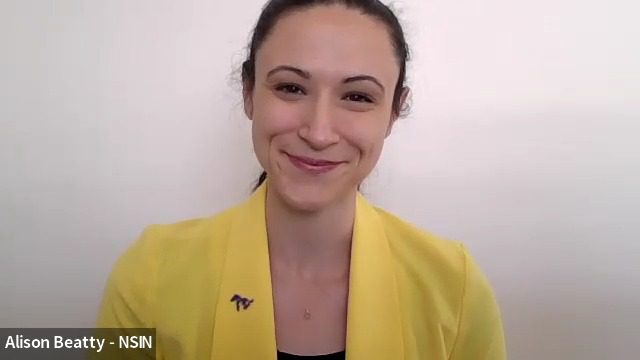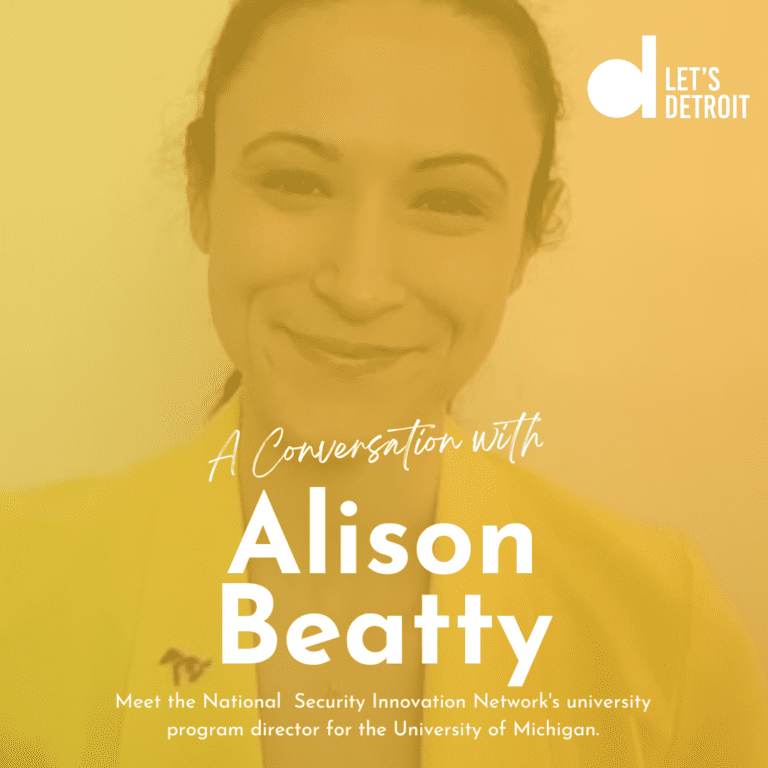August 10, 2022

 When discussing the startup community or innovation in Michigan, the focus is usually on the automotive and mobility industry. However, startups play a significant role in national security.
When discussing the startup community or innovation in Michigan, the focus is usually on the automotive and mobility industry. However, startups play a significant role in national security.
To gain insight into the role startups play in national security, Let’s Detroit’s Engagement Manager Jenny Orletski-Dehne sat down with new ambassador, Alison Beatty, university program director for the University of Michigan at the National Security Innovation Network (NSIN).
Beatty’s role is to connect startups, researchers, entrepreneurs, and young professionals who want to get involved in national security and work with the Department of Defense (DOD). Her journey from Ph.D. candidate to mobility specialist to program director is inspiring. In the interview, Beatty explains how she got to where she is now in her career, the cool companies and technology she gets to be involved in, and her advice for young professionals starting their careers.
Read the interview below to learn more:
I got into my current role via my work with Ann Arbor SPARK, a startup incubator and business accelerator in Ann Arbor. When I was there, I was the mobility specialist working under Komal Doshi, director of mobility programs. I was working with all the startups that, in Komal’s words, are related to “moving people, moving things, and moving less.” Many of the area’s startups work in national security, which was how I learned about NSIN. I eventually had the opportunity to switch to working more in the national security space full time.
I got my doctorate in public policy and political science. I was specifically interested in studying how groups learn from each other around the entire world. How do you figure out what’s already being done? If your idea is already being done, who’s doing something out there that’s better than you?
Public policy professionals forged their own path, and every industry needs public policy. So, I took the opportunity to decide which industry I wanted to go into. The industries that were most interesting to me at the time were space, aerospace, defense, and aviation. That’s why the mobility specialist job at Ann Arbor Spark was so cool for me because all four of those categories include mobility aspects.
I have to hand it to Komal [Doshi] at Ann Arbor SPARK for heavily emphasizing the point that you just mentioned. Mobility is everything.
Startups are trying to prioritize how to use their time and make the best use of the opportunities that come their way. The way that I usually think of it is that the DOD provides opportunities, training, and funding for people to do what they’re already doing and what they love to do. But because the DOD provides so many opportunities, it can a little bit hard to sort through. My role is to make it easy for people to identify the opportunities that would benefit them most. And then, if the opportunity makes sense for them, I help make that connection.
There are so many! One of the things I love about Ann Arbor SPARK, and what I love now at the DOD, is that sometimes I feel like I’m gazing into a crystal ball. You’re seeing things that feel like they’re coming from the future, that you had no idea we were even capable of doing.
I am doing really cool work with some mobility startups, like M-Vision, which won the autonomous vehicles hackathon that NSIN hosted in February.
I’m also starting to work with some companies that are working on more medically driven projects, which I never really worked on before. There’s one company out of the University of Michigan that has solutions to neutralize dangerous or infectious particles in the air around you. There are many companies around here working with medical devices that make it easier to heal people both in hospitals and on the battlefield. So, I’m getting to explore more companies than I ever even knew existed, and I’m loving it.
You’re completely right. I have yet to meet a technology-oriented startup that didn’t have some technology that was useful to someone in the DOD because there are all sorts of solutions needed—including personnel management, career and spousal management, and making sure that the families of the warfighters are supported. So, if you are a startup or an entrepreneur that’s working on tech in any field, you might have more national security ramifications – what we call dual-use technology – than you even realize. If you ever want to find out, you can always email me.
The universities are a pivotal, fundamental bedrock in the relations between NSIN and the community at large. For example, the memorandum of understanding between NSIN and the University of Michigan was signed by the Office of Innovation Partnerships, which is the university’s office for research alliances, licensing, and commercialization. That’s the part of the university that works with all the professors who have commercialized technology to create spinouts, startups, licenses, etc. So, it’s a two-way street.
I can bring opportunities to universities about grants, funding, training, or people in the field who need problems solved to innovation partnerships, and they can connect me with a professor that’s working on just that. Or the universities can come to me with a technology that either hasn’t gotten to work with anyone in the DOD yet or has worked with some people but wants to do more.
I did not. When I was growing up, I was such a shy person. But a couple of life things changed my perspective on that. I guess I would call myself an introvert who learned how to be and enjoy being an extrovert.
The first experience was when I was an exchange student in Germany in high school. I enrolled in a total-immersion program without speaking the language at all, and it was really frustrating not to be able to convey the simplest point. This led me to ask myself, “why would I ever not speak up at home when I have all of the linguistic tools at my disposal?” I thought it was so silly that I ever held back.
The second experience was during my doctorate process. I learned that the community feedback so highly prized in the Lead Startup Method is critical for professional success as well. Even though it’s hard, you have to get involved, engage with others and put your research out there so people can verify it and give you feedback. It’s hard and scary, but once you figure out how to do that, that is the network that propels you to success.
So, between those two things, I’ve made an effort to start meeting more people, learning about what they’re doing, and asking for help when I need it. It has turned into something that I really enjoy doing.
I can’t speak for others, and there’s so much more that we could get into, but I will say that every interaction that I’ve had so far has been very cordial, civil, and positive. There are more women joining national security industries all the time. And I would encourage anyone who ever thought, “oh, that’s a male-dominated industry, I can’t get into it,” to check that attitude at the door and reach out to me. Let’s get you involved. The commander of the ROTC program at the University of Michigan right now is a female, a former F-15 pilot, and super cool. Admiral Linda Fagan recently became the first woman to lead a service branch with her appointment as commandant of the Coast Guard.
We are all serving a higher purpose to protect and defend the United States. And making sure that everybody keeps that purpose at the forefront makes it a lot easier for people to put any feelings of negativity aside. My personal trick is to figure out what interests we have in common because when you establish that rapport, things flow smoothly from there.
“Fifty Cups of Coffee” is an idea that I followed when I started my job search. It’s the concept that the best way to find a job is to talk to your friends who you admire (and admire their jobs) and new people that you haven’t met yet, but who’re in a career that you think is really cool. You can either cold call them over LinkedIn or ask the first person you meet with who you should talk to next.
The theory is within 50 cups of coffee, you will have a job you really like that somebody put you in touch with. For me, it was around cup 25.
It was really scary to reach out to those people, but nobody declined to meet. I always found myself a little anxious before the meeting but then feeling really uplifted afterward. I strongly encourage that. I try to practice that now that I am working as well. I made it a quest to meet with every single person at SPARK to get a cup of coffee with them, just one-on-one. The only real rule is when the other person is done with their coffee, the meeting is over. It’s a fun system.
Very much so. I can think of many coffees from the top of my head that I’ve gotten with ladies. Women are typically associated with very strong connectivity habits, building a tight network. And like I said, I never had anyone, male or female, turn me down. So, yes, women are always willing to meet with you if they have the time. I also encourage you to just find one hobby that you have in common in that conversation as well. They will share with you the secrets that they’ve learned, how to get where they are, or how to succeed at what they’re doing.
Women, we need your help. You have brilliant solutions and innovations that other people would not have thought of. We need your voice. If you do not participate, you and your good ideas are not heard, and those important considerations do not get a seat at the table. So please be strong, be brave, and join the tech and national security fields. You will be glad that you did. And I would love to get a cup of coffee with anyone who is interested in following up.